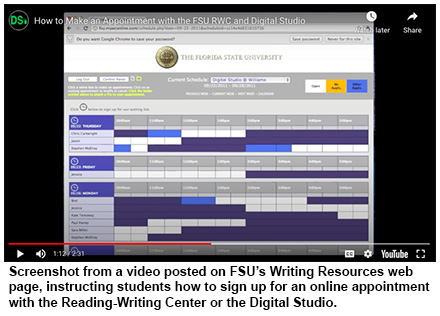Online support continues to be option for students
By Savannah Tindall
While students are aware of the adjustments made to transition to the digital classroom, they may not be aware that Florida State University’s academic resources can now be accessed digitally as well.
As stay-at-home orders continue because of the COVID-19 pandemic, FSU’s Reading-Writing Center (RWC) and Digital Studio (DS) will be online until campus reopens.
Students can sign up for appointments with tutors and consultants for either resource, which provide “writing and digital literacy support to all FSU students.” Before signing up for an online session, though, students should know that they need access to a laptop or desktop computer, since the platform is not supported on other devices.
Additionally, the computer needs a working camera and microphone so students can communicate with their resource contact. If a student does not have access to a computer, a webcam, a microphone, or the internet, they can email the RWC at for accommodations.
Once a student has the appropriate devices, the next step is to register for a MyWCOnline account, which is available here. After creating an account, log in here and sign up for a specific day, time, and tutor by clicking on a white block. If the available dates, times, or tutors do not work, a student can switch the RWC location on the login page and check that resource as well.
A personal experience
As I was writing this article and working on my ePortfolio, I decided I needed feedback on both projects, so I booked appointments with the RWC and the DS. I had a positive experience with both of the graduate students who helped me, Devan Schnecker from the RWC and Noah Patterson from the DS.
The online DS and RWC meetings run on separate platforms. My DS appointment was conducted through Zoom, where Patterson used the Share Screen function and went through my ePortfolio with me, which maintained the feeling of talking to someone face to face. For some students, this extra attention to their digital projects in a DS appointment may be better.
&“The Digital Studio usually operates on a consultant rather than a tutoring model; that means, usually, we check in on students as they work, instead of sitting next to them the whole time,” Patterson says. “Now that we're online, students get that one-on-one personalized attention. So, this move to online is especially great for students with a lot of questions.”
The online RWC session runs on the center’s specific software. The interface can best be described as a blend between Zoom and Google docs. Students upload the document they want feedback on, and tutors are able to comment on the file in a specific color, to show where the tutor has provided comments. Students also are able to revise the document, and the changes will show up in a different color than the tutor’s. The software also features a chatroom and webcam so students can discuss their projects with the tutors.
Schnecker has experience with online tutoring prior to the global pandemic, but she says doing the work this way all the time has changed the way she tutors.
“When you are face to face with a student and if they are anxious about their writing, it is easier to see in person rather than online because of their body language,” she says. “Now that it's online, I have to ask more questions to make sure the student is comfortable in the sessions and getting what they want in their session.”
While online tutoring from the RWC and DS may be uncharted territory for many FSU students, they should feel comfortable with the process to receive feedback on their work. Both the RWC and DS offer help with any project, whether it relates to academia or job/internship hunting or a student’s personal work.
“Right now, I think the only thing students should do is prioritize their health and well-being (both physical and mental) as we all adjust to this new post-COVID-19 world,” Patterson says. “That said, if students are struggling to balance schoolwork right now, we're here to help any way that we can. The DS is still just as equipped as it was to answer those questions and provide feedback as a reader and as a viewer.”
Schnecker echoes her colleague’s sentiments.
“We are at the end of the term, students are writing their final papers, and they are already stressed because of the pandemic.” she says. “I think knowing that they have someone like us here to help, just like they would have had as a resource if campus were open, may help ground students.”
She adds that tutors and consultants are also willing to talk about what’s happening in a student’s personal life before working on a project with them.
“I think having someone here to check in on your mental health and having a tutor being someone new to meet in this online space could be helpful for students in isolation,” Schnecker says.
Click here to access the homepage for the RWC and DS.
Savannah Tindall is a junior double majoring in English, with a concentration in editing, writing, and media, and public relations.
Follow the English department on Instagram @fsuenglish; on Facebook facebook.com/fsuenglishdepartment/; and Twitter, @fsu_englishdept

